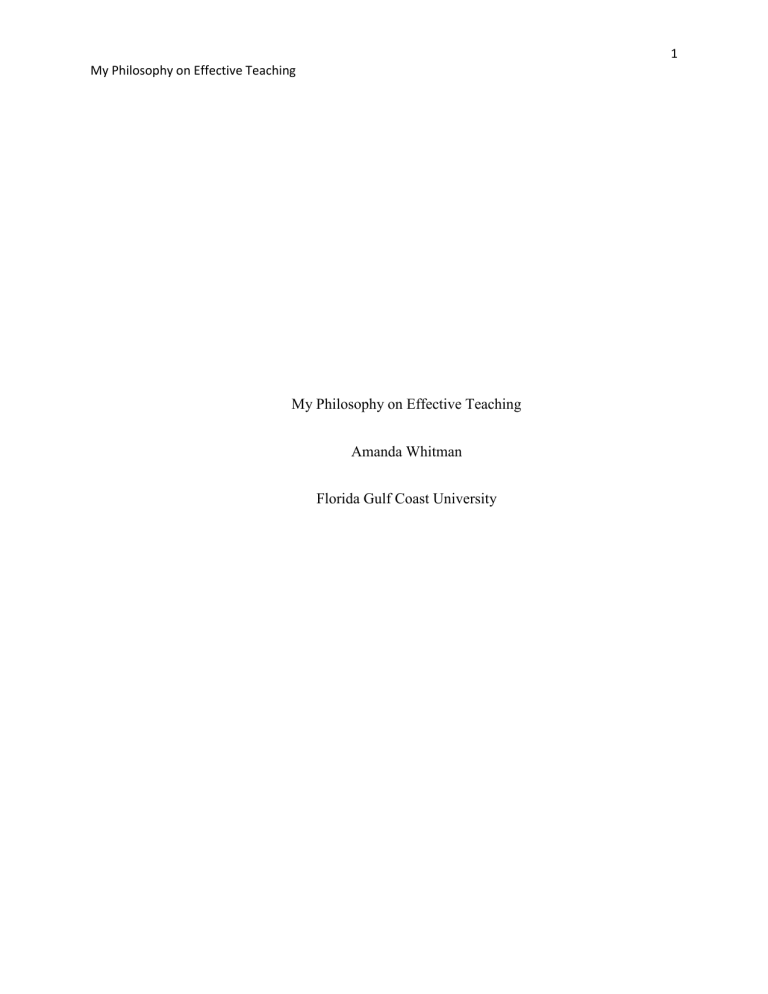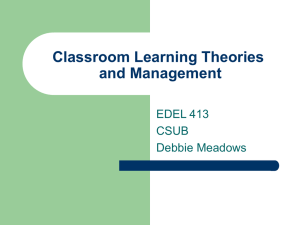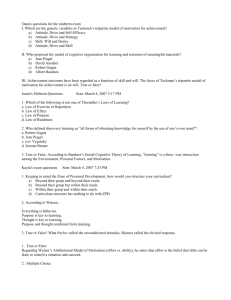philosophypaperprofessionalstudies

My Philosophy on Effective Teaching
My Philosophy on Effective Teaching
Amanda Whitman
Florida Gulf Coast University
1
2
My Philosophy on Effective Teaching
Abstract
This paper discusses how developing one’s own philosophy on education is the foundation of becoming an effective teacher. I discuss how I personally will become an educator with a large impact on her students based on the theories and philosophies presented by Jean Piaget and John
Dewey. Through teaching students on their own developmental level, and by allowing them to learn through experience, students will meet the required standards and have a positive learning experience. My teaching philosophies will directly affect not only my students, but the parents of these students as well as throughout the community in which I am teaching. My ultimate goal is to become a teacher that inspires and creates a large impact on every student who enters my classroom. I will achieve this with the help of the philosophies not only presented by John
Dewey and Jean Piaget, but also through the many other philosophers in which I have been introduced to.
My Philosophy on Effective Teaching
Education has always been a crucial part of the constant improvement of human society.
3
Most, if not all of those who reside in the developed world will experience the educational process, and some will find aspirations in continuing in this process by becoming educators themselves. These individuals whom aspire to become educators have a long road ahead to become effective teachers with a large impact, and also must develop their teaching foundations.
An important foundation of teaching is the development of one’s own teaching philosophies.
Being one of many aspiring teachers, I too must develop my own philosophies. After carefully examining several different key contemporary educational theorists and their philosophies, I have discovered what will work best for me as an educator.
In truth, I have taken away something from each of the philosophers which were presented in class, however it has been Jean Piaget and John Dewey who have really influenced my beliefs on effective teaching. Jean Piaget sticks out to me because of his theories on a child’s cognitive development, and Dewey influences me through his theories on education through experience. With these two philosophers, the foundation of my future classroom begins to form.
According to the SIU Board of Trustees (2010), John Dewey once said, “Education is not preparation for life, but life itself” and I cannot help to take this quote to heart and use it as a guide to my future classroom. Dewey was a strong advocate for education through experience and a classroom where students shared some sort of say in what went on in their studies. Keeping my authority in the classroom, I will always ensure that the material presented in my classroom is relevant to the student’s life. I believe that this new world of standardized testing has forced teaching to come away from this idea, and when I become an instructor of my own classroom I
My Philosophy on Effective Teaching will do my best to allow students to experience an education that they enjoy and effects them
4 directly, on top of their preparation for these tests.
Though John Dewey influences me in the process of education itself, Piaget seems to confirm why this form of education works best for me. Piaget was best known in education for presenting his theories on cognitive development. He believed that humans developed in this aspect in four stages: the sensorimotor stage between the ages of zero and two years, the preoperational stage which occurs between two and six years, the concrete operational stage that begins at six years of age and twelve years of age, and finally the formal operational stage which occurs from twelve years of age onto adulthood. Between these four stages, Piaget argues that human beings go from exploring their world through direct sensory and motor skills until finally reaching a formal way of thinking abstractly as an adult (McLeod, 2009).
In regards to my classroom, I will always make sure that the material that I teach is developmentally appropriate for the age group of my students. As a future educator at the
Elementary School level, I will most likely be teaching students that are within the concrete operational stage (McLeod, 2009). This means that my students will be able to think on a logical level which will include lessons on adding and subtracting, reading comprehensive, and thinking critically on every school subject taught. Again, I will be using Dewey’s theory on education through experience in order to make sure that these particular developmentally appropriate lessons meet students on a relatable level. This could include the use of modern technology such as electronic tablets or computers, and making sure that the lessons pertain to their lives somehow.
My Philosophy on Effective Teaching
Teaching with these theories in mind not only will positively affect my future students,
5 but it will also go beyond the classroom and have an influence on the parents of my students and the community itself. I believe in direct communication with every parent of the students I teach.
My students’ parents have a right to know about the standards that are being met in the classroom, what kind of material I’ll be teaching, and why the knowledge I am presenting is fundamentally appropriate for the students age group. I have no problem being open with the parents about my philosophies on how to run a classroom, and I will always be open to discussing what works best for each student. Just like Dewey emphasizes on open communication with the students, there should also be communication with their parents.
By using these philosophies, and understanding how each and every one of my student learns and develops appropriately, I should have no problem reaching my goal to one day become a teacher with a very large impact. This should not only affect my individual classroom, but so long as I am a teacher in the community in which I am employed in, the ripple effect of my skills should reach beyond the classroom and into my community. I want to be the teacher that my students look back on and think fondly of, maybe be their inspiration in their own personal goals to succeed. I want the parents of my students to think highly of me, and to speak well of me in the community. I know that by using the theories and philosophies presented by
Jean Piaget and John Dewey, along with many of the other insightful philosophers of modern day, I will become an amazing educator, one that will influence each student even beyond the classroom setting.
My Philosophy on Effective Teaching
References
McLeod, S. (2009). Jean Piaget. Simply Psychology. Retrieved from http://www.simplypsychology.org/piaget.html
SIU Board of Trustees (2010). FAQ Page. The Center for Dewey Studies at Southern
Illinois University Carbondale.
Retrieved from
http://www.siuc.edu/~deweyctr/faq.html
6





